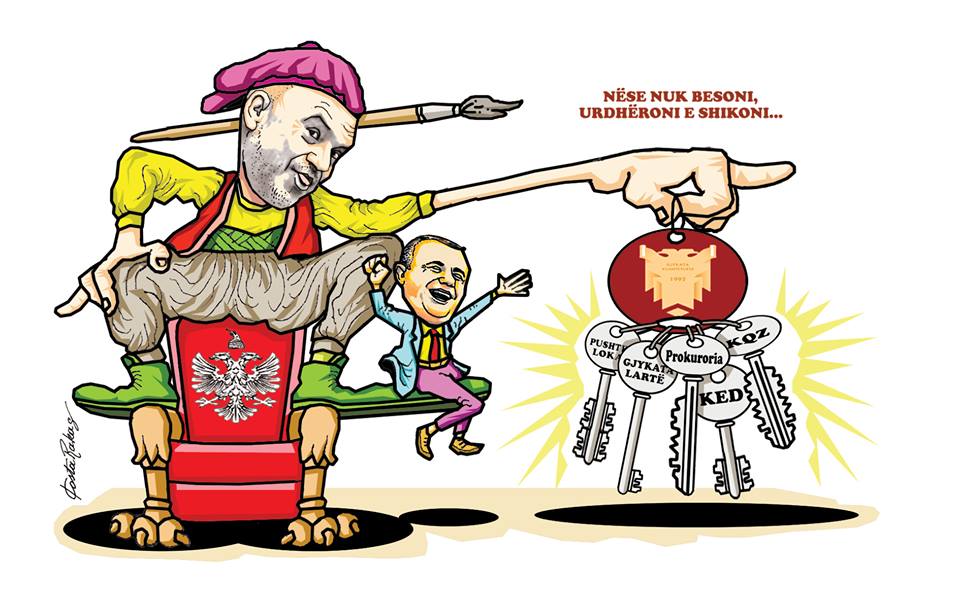-Kushti i parë shtesë është përfundimi i Reformës Zgjedhore
-Eshtë shtuar anullimi i ligjit antishpifje për median
– Anullimi i ligjit për betimin e antarëve të Gjykatës Kushtetuese
– Ndërkohë parlamenti hollandez ka kërkuar të zbatohen rekomandimet e Komisionit të Venecias
Presidentët dhe kryeministrat e vendeve anëtare të BE-së në 28 dhe 29 qershor në Bruksel, do të diskutojnë për vendet që janë pjesë e procesit të zgjerimit. Konkluzione të përbashkëta do të miratohen në fund të takimit, por për tekstin e draftit është rënë dakord tashmë. Drafti i konkluzioneve përfundimtare është dorëzuar në kryeqytetet evropiane dhe Lapsi.al ka arritur të sigurojë një pasqyrë të këtij dokumenti, që duhet të miratohet në nivel të shefave të shteteve dhe qeverive të 28 vendeve anëtare të BE.
Nyja e debatit mes presidentëve dhe kryeministrave të Europës do të lidhet me shanset e Shqipërisë dhe Maqedonisë për të marrë ose jo dritën e gjelbër, për të filluar ose jo bisedimet e pranimit me BE-në. Teksti I draftit aktual që e përfshin vendimin e Këshillit të BE-së për të miratuar hapjen e negociatave të pranimit me Tiranën dhe Shkupin, por, nga informacioni paraprak, ka një mundësi të lartë që gjatë debatit, të ketë ndërrime në paragrafët që kanë të bëjnë me hapjen e negociatave për anëtarësim, nga Maqedonia dhe Shqipëria.
Dokumenti nuk ka në brendësi të tij një datë fikse për hapjen e negociatave dhe fillimin e diskutimit për kapitujt e negociimit. Pavarësisht se Komisioni Europian e rekomandoi hapjen e negociatave, teksti që do të kenë në tryezë liderët e BE-së në Bruksel nuk e përmban një detaj thelbësor si ky i datës dhe kjo lidhet me pjesën tjetër të dokumentit, që janë kushtet dhe pritshmëritë e vendeve të Bashkimit Europian nga qeveria shqiptare.
Ndaj në tekst, rreshtohen disa preh hapave të mëtejshme që duhet të bëjë qeveria shqiptare. Detyrat kanë të bëjnë me vazhdimin e reformës në gjyqësor, luftën kundër drogës, korrupsionit dhe krimit të organizuar dhe sigurisht, një marrëdhënie më e mirë me opozitën.
Në tekstin që i është shpërndarë vendeve të BE, thuhet se “Këshilli Evropian do të mirëpresë një progres të qëndrueshëm në zbatimin e pesë prioriteteve kryesore në Shqipëri. Nga ky vend do të kërkohet të rrisë progresin dhe të vazhdojë intensivisht reformën gjyqësore, me qëllim të rritjes së pavarësisë, llogaridhënies, profesionalizmit dhe efikasitetit të sistemit gjyqësor”
“Këshilli thekson rëndësinë e Shqipërisë për të arritur rezultate të tjera të prekshme dhe të qëndrueshme, duke përfshirë edhe në një fushë të veçantë – luftën kundër kultivimit dhe trafikimit të drogës” përfundon projekti.
Tiranës zyrtare gjithashtu do t’i kërkohet të rrisë përpjekjet dhe të tregojë rezultate të prekshme në luftën kundër korrupsionit dhe krimit të organizuar.
Përfundimet mbi Shqipërinë do të kërkojnë “një dialog të qëndrueshëm dhe konstruktiv” midis qeverisë dhe opozitës në reformat e lidhura me BE, pasi ajo konsiderohet thelbësore në proceset evropiane dhe afrimin e vendit me strukturat evropiane. Shqipëria do të vlerësohet për vazhdimin e harmonizimit të plotë të politikës së saj të jashtme dhe të sigurisë me politikën e BE. Ajo gjithashtu do të mirëpresë angazhimin e autoriteteve shqiptare në luftën kundër terrorizmit dhe ekstremizmit të dhunshëm.
Pak ditë më parë, Maqedonia arriti të zgjidhë mosmarrëveshjet me Greqinë për çështjet e emrit. Zaev ia doli që para vendimit të Këshillit Europian të shfaqet në mediat europiane duke festuar me Tsipras për gjetjen e zgjidhjes. Për Ramën, një marrëveshje me Greqinë, ishte një shans i humbur, por kryeministri shqiptar po luan fort me idenë e një kampi për refugjatët në vendin tonë, një ofertë që do të lehtësonte liderët europianë nga presioni, gjithnjë në këmbim të votës pro hapjes së negociatave.
Following the discussions in COREPER on Friday, 20 March 2020, the Presidency concluded that the text as set out in Annex 1 – together with the three statements (Annexes 2, 3 and 4) – was acceptable to delegations with one outstanding issue.
The outstanding issue concerns the part on Albania, where one delegation requested the insertion of a reference concerning the law on the next census and the carrying out of the first registration of properties.
The Council Legal Service advised that the references in paragraphs 6 and 10 with regard to the endorsement by the European Council be modified to refer to the “Members of the European Council”.
ANNEX 1
GENERAL AFFAIRS COUNCIL
DRAFT COUNCIL CONCLUSIONS
ON ENLARGEMENT AND STABILISATION AND ASSOCIATION PROCESS
THE REPUBLIC OF NORTH MACEDONIA AND The REPUBLIC OF ALBANIA
- The Council on 18 June 2019 took good note of the Commission’s recommendations to open accession negotiations with the Republic of North Macedonia and the Republic of Albania. The Council notes that enlargement was further discussed in the European Council on 17-18 October 2019, which decided to revert to this issue before the EU-Western Balkans summit in Zagreb in May 2020.
- Recalling the Thessaloniki Agenda and the Sofia Declaration, the Council reiterates the EU’s unequivocal support to the European perspective of the Western Balkans. In line with previous Council conclusions, and in the framework of the Copenhagen political criteria and of the Stabilisation and Association Process, which remains the common framework for relations with the Western Balkans, the Council reaffirms the need, in accordance with the 2006 renewed consensus on enlargement, for fair and rigorous conditionality and the principle of own merits. Good neighbourly relations and regional cooperation remain essential elements of the enlargement process, as well as of the Stabilisation and Association Process. The Council recalls the importance of achieving tangible results and implementing in good faith bilateral agreements, including the Prespa Agreement with Greece and the Treaty on Good Neighbourly Relations with Bulgaria as part of the enlargement process. The Council also notes the importance of human rights and of respecting the rights of persons belonging to minorities.
- The Council endorses the Commission Communication on “Enhancing the accession process – A credible EU perspective for the Western Balkans” of 5 February 2020, aiming to reinvigorate the accession process by making it more predictable, more credible, more dynamic and subject to stronger political steering, based on objective criteria and rigorous positive and negative conditionality, and reversibility. The fundamental democratic, rule of law and economic reforms represent the core objective of the accession process. The Council looks forward to the Commission’s proposals integrating the enhanced approach in future negotiating frameworks and building on applicable established practice under the renewed consensus on enlargement. The proposed changes can be accommodated within the existing negotiating frameworks with Montenegro and Serbia with the agreement of the respective countries.
- Having regard to this, the Council confirms that the enlargement process built on mutual trust, confidence and clear criteria and commitments will be continued on the basis of the Commission Communication on “Enhancing the accession process – A credible EU perspective for the Western Balkans” as applicable, while fully respecting the integrity of the work of the Council and its autonomy as regards the presence of third parties at its meetings. In this context, the Council stresses the importance of ensuring that the EU can maintain and deepen its own development, including its capacity to integrate new members.
REPUBLIC OF NORTH MACEDONIA
- After having examined the Commission’s updated report of 2 March 2020 on the progress made by the Republic of North Macedonia, the Council welcomes that the country has demonstrated its determination to advance the EU reform agenda and has delivered tangible and sustained results, fulfilling the conditions identified by the June 2018 Council for the opening of the accession negotiations.
- In light of the progress achieved on reforms and the fulfilment of the conditions set unanimously by the Council in June 2018, the Council, subject to endorsement by the European Council members, decides to open accession negotiations with the Republic of North Macedonia.
- The Council invites the Commission to submit a proposal for a framework for negotiations in line with the European Council’s December 2006 conclusions, integrating the enhanced approach to the accession process in line with paragraph 3. The Council takes note of the intention of the Commission to begin the necessary preparatory work immediately.
- The first intergovernmental conference should be convened as soon as possible after the adoption of the negotiating framework by the Council.
The Council further invites the Commission to continue to monitor the progress and continued compliance in all areas of the conditions identified by the Council in June 2018 related to the opening of negotiations and to carry out and complete the process of analytical examination of the EU acquis with the country, starting with the fundamentals’ cluster.
REPUBLIC OF ALBANIA
- After having examined the Commission’s updated report of 2 March 2020 on the progress made by the Republic of Albania, the Council welcomes that the country has demonstrated its determination to advance the EU reform agenda and has delivered tangible and sustained results, fulfilling the conditions identified by the June 2018 Council for the opening of the accession negotiations.
- In light of the progress achieved on reforms and the fulfilment of the conditions set unanimously by the Council in June 2018, the Council, subject to endorsement by the European Council members, decides to open accession negotiations with the Republic of Albania.
The Council invites the Commission to submit a proposal for a framework for negotiations in line with the European Council’s December 2006 conclusions, integrating the enhanced approach to the accession process in line with paragraph 3. The Council takes note of the intention of the Commission to begin the necessary preparatory work immediately.
The first intergovernmental conference should be convened as soon as possible after the adoption of the negotiating framework by the Council.
Prior to the first intergovernmental conference, Albania should adopt the electoral reform fully in accordance with OSCE/ODHIR recommendations, ensuring transparent financing of political parties and electoral campaigns, ensure the continued implementation of the judicial reform, including ensuring the functioning of the Constitutional Court and the High Court, taking into account relevant international expertise including applicable opinions of the Venice Commission, and finalise the establishment of the anti-corruption and organised crime specialised structures. Albania should also further strengthen the fight against corruption and organised crime, including through cooperation with EU Member States and through the action plan to address the Financial Action Task Force (FATF) recommendations. Tackling the phenomenon of unfounded asylum applications and ensuring repatriations and amending the media law in line with the recommendations of the Venice Commission remain important priorities. The Commission will provide a report on these issues, including progress regarding the track record, when presenting the negotiating framework.
The negotiating framework will be adopted by the Council and has to reflect that Albania has successfully addressed all five key priorities such as the initiation of criminal procedures against judges and prosecutors accused of criminal conduct during the vetting process, initiation of proceedings against those accused of vote buying, a sound track record regarding fight against corruption and organised crime at all levels, including initiation of proceedings and completion of first proceedings against high ranking public officials and politicians, tangible progress regarding reform of public administration, implementation of the reform of the electoral law as well as a final decision on the lawfulness of the local elections of 30 June 2019, as well as further progress in the adoption of the remaining implementing legislation related to the 2017 framework law on the protection of national minorities, the adoption of the law on the population census in accordance with the Council of Europe recommendations, and the advancement of the process of registration of properties.
The Council further invites the Commission to continue to monitor the progress and compliance in all areas related to the opening of negotiations and to carry out and complete the process of analytical examination of the EU acquis with the country, starting with the fundamentals’ cluster.
ANNEX 2
Statement by the Commission
In accordance with its updated report, the Commission considers that on the issues listed by the Council for Albania as necessary for the adoption of the negotiating framework and prior to the first intergovernmental conference, Albania has already achieved significant progress by increasing its efforts and delivering further tangible and sustainable results in these key areas. The Commission will continue to monitor the progress and track record on all these areas and will return to them in the annual country reports on Albania.
ANNEX 3
Council Statement on the integrity and autonomy of its work
The Council recalls that occasional presence of third parties, including a third country, at Council meetings is possible on an ad hoc basis and for specific items on the agenda, subject to the specific requirements that usually apply[1] to such instances aimed at preserving the integrity of its work.
In all circumstances, the Council’s decision-making autonomy must be protected. Therefore, third countries, including those engaged in the enlargement process, may not be invited to participate in, nor be allowed to have an impact or influence on the Council’s decision-shaping or decision-making.
An observer status can only be granted after the signature of the Accession Treaty.
ANNEX 4
Council statement
The endorsement of the Commission Communication on “Enhancing the accession process – A credible EU perspective for the Western Balkans” of 5 February 2020 does not prejudge decision-making methods in other areas.
[1] Doc 6566/20.




















